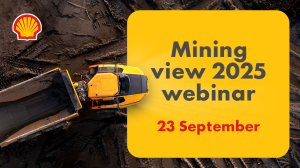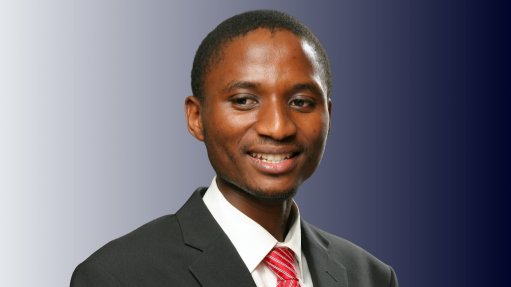SA mining weighs innovation, policy shifts and sustainability during webinar

The Shell Mining View 2025 webinar brought together mining leaders, financiers and policy experts to unpack South Africa’s shifting mining landscape
South Africa’s mining industry remains a cornerstone of the economy, but it is entering a period of accelerated transition, with stakeholders urging greater policy certainty, technological innovation and sustainability. These themes were central to the Shell Mining View 2025 webinar, which brought together mining executives, financiers, service providers and policy experts to discuss the sector’s evolving challenges and opportunities.
Facilitated by Shell South Africa head of direct sales Vuyo Vezi, the discussion featured Minerals Council South Africa deputy head of techno-economics Christian Teffo, Standard Bank head of mining Abel Andries, Shell Lubricants South Africa technical and sales manager Mpho Mokwena, and Universal Coal GM Ian Chauke.
Mining remains one of South Africa’s largest economic contributors, with Vezi noting that mining delivered R360-billion to GDP in 2024, R630-billion in export earnings, and R42-billion in tax revenue, while accounting for 15% of foreign direct investment. The sector provides over 450 000 direct jobs. Yet, panellists agreed that structural challenges such as energy insecurity, logistics bottlenecks, policy uncertainty and community pressures continue to weigh on investment and growth.
ESG and Social Licence
Chauke argued that the past five years have been defined by the rise of ESG imperatives alongside the industry’s traditional “zero harm” focus. “Everybody is speaking ESG,” he said, adding that while companies have adopted global best practices, South Africa still lacks uniform systems and KPIs for measuring ESG performance. “What works in Australia does not necessarily work in South Africa,” he cautioned.
Teffo highlighted progress in mine safety, noting that fatalities declined to 42 in 2024, down from nearly 1 000 deaths yearly three decades ago. But he warned that exploration investment remains below 1% of global spend, limiting long-term growth. He also pointed to policy implementation gaps, arguing that communities often remain excluded from energy transition and beneficiation strategies.
Community engagement was a recurring theme. Andries noted that financial institutions now assess mining projects through an ESG lens, with social acceptance critical for securing funding. He pointed to land ownership and inclusion disputes in Mpumalanga as examples of how community concerns can directly affect project viability.
Policy and Regulatory Environment
Policy uncertainty was identified as a major hurdle. Chauke cited delays in modernising the mining cadastre system, which deters exploration. Beneficiation, artisanal mining regulation and the classification of coal as a critical mineral were also discussed as areas requiring clarity.
Teffo acknowledged government’s recent reforms, including amendments to the Electricity Regulation Act enabling private generation up to 200 MW, and plans to open Transnet’s rail network to private participation. He also welcomed the launch of South Africa’s critical minerals strategy, covering manganese, chrome and PGMs – essential for EV batteries and hydrogen technologies.
Still, he cautioned that crime, illegal mining and infrastructure breakdowns continue to undermine competitiveness. “There was a time when we were the number one mining country, not only in Africa, but in the world. We need to get back to those levels,” he said.
Financing Mining’s Future
From the financial sector’s perspective, Andries described the financial appetite of mining as a “dicey space,” given fluctuating commodity cycles and export dependency. Standard Bank separates its financing by commodity, treating gold, PGMs, manganese and coal differently based on risk exposure. “Mining is actually exposed to any fluctuation from currency to commodity space – the stuff that we don’t control internally,” he said.
Despite this, he stressed that the bank maintains a fully fledged mining desk and is expanding its book in the sector, while aligning with climate policies that support decarbonisation.
Meanwhile, digitalisation and decarbonisation emerged as critical drivers of efficiency and sustainability. Mokwena explained that Shell has invested in biodegradable lubricants and plant-based transformer oils, extending oil drain intervals and enabling predictive maintenance to reduce hydrocarbon use. “It’s a collaborative approach with mining operations, ensuring less environmental impact while alleviating financial pressures,” he said.
Chauke and Teffo cited AI-driven predictive maintenance, fleet electrification and collision avoidance systems as emerging technologies reshaping operations. South Africa, Teffo noted, is already a global leader in proximity detection systems, having regulated their adoption ahead of international benchmarks.
Water stewardship is another area of innovation. Mines are investing in recycling technologies to repurpose effluent for communities or return it safely to rivers, while research groups are developing treatment methods tailored to different water types.
However, panellists cautioned against over-reliance on imported machinery and technology. “For as long as we’re not the maker of these machines, we’re not participants in the industrialisation of this issue,” Chauke argued, calling for stronger domestic manufacturing capacity.
Closing the session, Vezi noted that while mining continues to underpin South Africa’s economy, its future depends on balancing profitability with sustainability. The panel agreed that collaboration between government, industry, financiers and communities will be essential to restore competitiveness and ensure the sector remains a pillar of inclusive growth.
“Mine rehabilitation, carbon reduction, biodiversity conservation and water stewardship are no longer optional – they are imperative,” she concluded.
Article Enquiry
Email Article
Save Article
Feedback
To advertise email advertising@creamermedia.co.za or click here
Press Office
Announcements
What's On
Subscribe to improve your user experience...
Option 1 (equivalent of R125 a month):
Receive a weekly copy of Creamer Media's Engineering News & Mining Weekly magazine
(print copy for those in South Africa and e-magazine for those outside of South Africa)
Receive daily email newsletters
Access to full search results
Access archive of magazine back copies
Access to Projects in Progress
Access to ONE Research Report of your choice in PDF format
Option 2 (equivalent of R375 a month):
All benefits from Option 1
PLUS
Access to Creamer Media's Research Channel Africa for ALL Research Reports, in PDF format, on various industrial and mining sectors
including Electricity; Water; Energy Transition; Hydrogen; Roads, Rail and Ports; Coal; Gold; Platinum; Battery Metals; etc.
Already a subscriber?
Forgotten your password?
Receive weekly copy of Creamer Media's Engineering News & Mining Weekly magazine (print copy for those in South Africa and e-magazine for those outside of South Africa)
➕
Recieve daily email newsletters
➕
Access to full search results
➕
Access archive of magazine back copies
➕
Access to Projects in Progress
➕
Access to ONE Research Report of your choice in PDF format
RESEARCH CHANNEL AFRICA
R4500 (equivalent of R375 a month)
SUBSCRIBEAll benefits from Option 1
➕
Access to Creamer Media's Research Channel Africa for ALL Research Reports on various industrial and mining sectors, in PDF format, including on:
Electricity
➕
Water
➕
Energy Transition
➕
Hydrogen
➕
Roads, Rail and Ports
➕
Coal
➕
Gold
➕
Platinum
➕
Battery Metals
➕
etc.
Receive all benefits from Option 1 or Option 2 delivered to numerous people at your company
➕
Multiple User names and Passwords for simultaneous log-ins
➕
Intranet integration access to all in your organisation



















